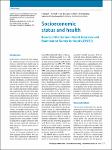Socioeconomic status and health
Results of the German Health Interview and Examination Survey for Adults (DEGS1)
Kroll, Lars Eric
Lippe, Elena von der
Müters, Stephan
Stolzenberg, Heribert
The analysis focuses on the connection between socioeconomic status (SES) and five health outcomes in the 18- to 79-year-old population of Germany. It uses data from the German Health Interview and Examination Survey for Adults (DEGS1) which the Robert Koch Institute conducted in the period from 2008–2011 (n=8,152). Socioeconomic status is recorded via a multidimensional index which includes information on education attainment, occupational status and household income. The results show that persons with a low socioeconomic status have a self-rated health status which is worse than that of persons with a medium or high socioeconomic status, and that they have diabetes more frequently. They also have a higher risk of depressive symptoms, obesity and no sports activity. The results illustrate that health chances and the risk of illness are still very socially unevenly distributed, thus emphasising the significance of political interventions to reduce health inequalities.
No license information

